LUMENTUT, AURELIA RAMADHIA (2024) HIT SUBTYPE OF AFFECT VERB UNDER DIXON’S THEORY IN ENGLISH AND MAKASSARESE: SEMANTIC PRINCIPLE = HIT SUBTYPE OF AFFECT VERB UNDER DIXON’S THEORY IN ENGLISH AND MAKASSARESE: SEMANTIC PRINCIPLE. Skripsi thesis, Universitas Hasanuddin.
![[thumbnail of Cover]](/45643/1.hassmallThumbnailVersion/F022201012_tesis_07-10-2024%20cover1.png)

F022201012_tesis_07-10-2024 cover1.png
Download (119kB) | Preview
F022201012_tesis_07-10-2024 1-2(FILEminimizer).pdf
Download (839kB)
F022201012_tesis_07-10-2024 dp(FILEminimizer).pdf
Download (500kB)
F022201012_tesis_07-10-2024.pdf
Restricted to Repository staff only until 9 September 2027.
Download (1MB)
Abstract (Abstrak)
The research aims to compare the sentence structures and meaning interpretations of hit verbs in English and Makassarese. The data for the research were drawn from two sources: the English data came from the Corpus of Contemporary American English (COCA), while the Makassarese data were sourced from the Mangkasara Dictionary. The data were gathered and analyzed using a qualitative descriptive approach. The findings of the research indicates that Makassarese language has fourteen kinds of “hit” as follows: ambak, bakji, dattek, ganrang, jaguruk, kandatto, peppek, racca’, tampiling, tamba’, tempa, tette, tunrung, tuntung. Both English and Makassarese could used intransitive and transitive verbs. In English, "hit" has a basic meaning as an action of striking or pounding something with hands or another object. Nevertheless, the meaning of "hit" can also be broader and include concepts such as touching or meeting casually with something, achieving or reaching something successfully, like achieving a goal or target, having a strong impact or influencing significantly, gaining popularity or attracting attention quickly or suddenly. In Makassarese, "hit" also refers to the sound produced from direct or indirect contact between objects or people. The meaning of "hit" is not limited to physical actions of striking, but can also refer to various concepts involving strong influence or impact. The particular differences of hit verb can be seen from two aspects, semantically and syntax. English construction mostly started by subject or something as agent which is followed by verb, while in Makassarese the construction mostly started by hit as a verb, agent in causer slot, noun phrase as target. The clause structures in Makassarese have some variations and can be simplified to become only a verb (or a verb phrase) as long as the subject is comprehensible from the previous context. The pattern of Makassarese language structure are VP+NP+adj, VP+NP, NP+V+NP, VP+NP+V+N, VP+NP+N.
Keyword : hit verbs; affect verb; meaning; construction
| Item Type: | Thesis (Skripsi) |
|---|---|
| Uncontrolled Keywords: | Hit verbs; affect verb; meaning; construction. |
| Subjects: | P Language and Literature > P Philology. Linguistics |
| Divisions (Program Studi): | Fakultas Ilmu Budaya > Bahasa Inggris |
| Depositing User: | Rasman |
| Date Deposited: | 30 Jun 2025 05:06 |
| Last Modified: | 30 Jun 2025 05:06 |
| URI: | http://repository.unhas.ac.id:443/id/eprint/45643 |


